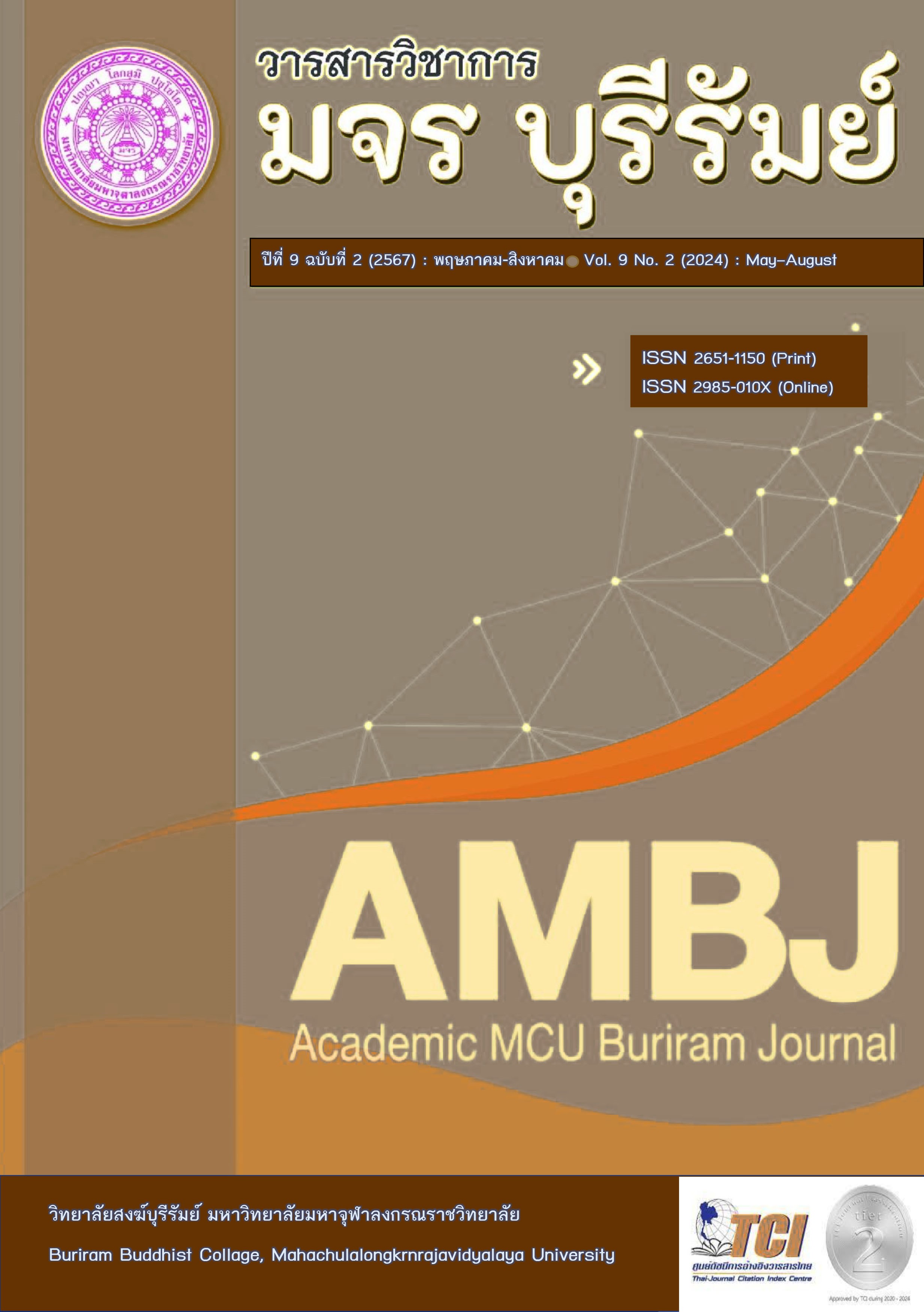A Development of a Gambling-Based Recreational Program to Prevent Dementia for the Elderly in Geriatric School: A Feasibility Study
Keywords:
Recreation Programs, Gambling, Dementia, Elderly, Geriatric SchoolAbstract
Geriatric school is considered a proactive form of activity that has been successful in promoting Thai seniors' quality of life today. The objectives of this study were to develop a gambling-based recreational program to prevent dementia in elderly people in geriatric schools and to study the satisfaction of elderly people in geriatric schools toward the recreational program developed by researchers using the Research and Development (R & D) method to conduct the research. The sample group used in the experiment was 30 elderly people from Duan Yai Rom Pho Thong Geriatric School, Duan Yai sub-district, Wang Hin District, Sisaket Province, collected by quota sampling between October and December 2023. They participated in a recreational program for 3 months, once a month (first week of the month), for 60 minutes each time. The quantitative data was analyzed using mean and standard deviation, while the qualitative data was analyzed by content analysis.
The research results found that:
1. The recreational program developed by researchers consists of five activities: 1) Fun number; 2) Jovial gourd, crab, and fish; 3) Magic wheel; 4) Great fun lottery; and 5) Lucky dice. The results of participating in this recreational program found that the elderly have practiced brain exercises, had fun, reduced stress, and helped promote good social interaction in geriatric school.
2. The assessment of satisfaction results by the sample group of elderly in geriatric school toward the recreational program was at a high level. ()=4.42, S.D.=0.81).
References
กนกวรรณ วิลาวัลย์ และเกียรติศักดิ์ สุขเหลือง. (2566). กิจกรรมที่ใช้ห่างไกลภาวะสมองเสื่อมของผู้สูงอายุ. วารสาร มจร สังคมศาสตร์ปริทรรศน์, 12(6), 371-379.
กรมกิจการผู้สูงอายุ. (2566). โรงเรียนผู้สูงอายุประเทศไทย (กุมภาพันธ์ 66). เข้าถึงได้จาก https://www.dop.go.th/th/know/5/44 (สืบค้นเมื่อ 15 มกราคม 2567).
ถนอมวงศ์ กฤษณ์เพ็ชร์ และภูเบศร์ นภัทรพิทยาธร. (2564). การดูแลสุขภาพสมองด้วยกิจกรรมนิวโรบิกสำหรับผู้สูงวัย. วารสารวิทยาศาสตร์การกีฬาและสุขภาพ, 22(2), 136-145.
มูลนิธิสถาบันวิจัยและพัฒนาผู้สูงอายุไทย. (2563). “ภาวะสมองเสื่อม” ป่วยเพิ่มปีละ 1 แสนราย สถิติชี้ ร้อยละ 50 ของผู้สูงวัย 80 ขึ้นไปมีอาการ. เข้าถึงได้จาก https://thaitgri.org/?p=38965 (สืบค้นเมื่อ 15 มกราคม 2567).
รุ่งนภา อุดมลาภ และจิราพร เกศพิชญวัฒนา. (2561). ผลของโปรแกรมการทบทวนชีวิตคู่ต่อภาระของ ผู้ดูแลที่เป็นคู่สมรส ผู้สูงอายุที่มีภาวะสมองเสื่อม. วารสารพยาบาลศาสตร์ จุฬาลงกรณ์มหาวิทยาลัย, 30(3), 103-115.
ศูนย์วิจัยเพื่อการพัฒนาสังคมและธุรกิจ. (2560). การศึกษาสถานการณ์ พฤติกรรม และผลกระทบการพนัน ในประเทศไทยประจำปี 2560. รายงานการวิจัย. ศูนย์ศึกษาปัญหาการพนันจุฬาลงกรณ์มหาวิทยาลัย.
สำนักงานพัฒนาสังคมและความมั่นคงของมนุษย์จังหวัดศรีสะเกษ. (2565). บัญชีรายชื่อโรงเรียนผู้สูงอายุจังหวัดศรีสะเกษ ประจำปี 2565. ศรีสะเกษ: สำนักงานพัฒนาสังคมและความมั่นคงของมนุษย์ จังหวัดศรีสะเกษ.
สุทธิศรี ตระกูลสิทธิโชค. (2561). การป้องกันภาวะสมองเสื่อมในผู้สูงอายุ. วารสารการพยาบาลและการดูแลสุขภาพ, 36(4), 6-14.
สุภาวดี ขุนทองจันทร์. (2561). สถานการณ์การพนันในผู้สูงวัย พื้นที่จังหวัดอุบลราชธานีและนครราชสีมา. รายงานการวิจัย. ศูนย์ศึกษาปัญหาการพนันจุฬาลงกรณ์มหาวิทยาลัย.
Cohen-Mansfield, J., Marx, M. S., Dakheel-Ali, M., Regier, N. G., & Thein, K. (2019). The impact of stimuli on affect in persons with dementia. Journal of Alzheimer's Disease, 67(4), 1345-1356.
Engeström, Y., Miettinen, R., & Punamaki, R.L. (1999). Perspectives on Activity Theory. UK: Cambridge University Press.
Likert, R. (1967). The Human Organization: Its Management and Value. New York: McGraw-Hill Book.
Michael, E.C., McCormick, B.P., & Van Puymbroeck, M. (2020). Recreational Therapy: An Introduction. 5th edition. Champaign: Sagamore-Venture.
Rezwan, A.K.M., Hasnat, A., Rafiq, M.G., Ahamed, F., Jahangir, R., & Barua, D. (2022). Patients Satisfaction Level About Physiotherapy Service in Different Rehabilitation Center of Dhaka City-A Cross Sectional Survey Based Study. International Journal of Research Publication and Reviews, 3(6), 2188-2193.
Downloads
Published
How to Cite
Issue
Section
License
Copyright (c) 2024 Academic MCU Buriram Journal

This work is licensed under a Creative Commons Attribution-NonCommercial-NoDerivatives 4.0 International License.
ทัศนะและความคิดเห็นที่ปรากฏในบทความวารสารฉบับนี้ถือเป็นความรับผิดชอบของผู้เขียนบทความนั้น ไม่ถือเป็นทัศนะและความรับผิดชอบของบรรณาธิการ





